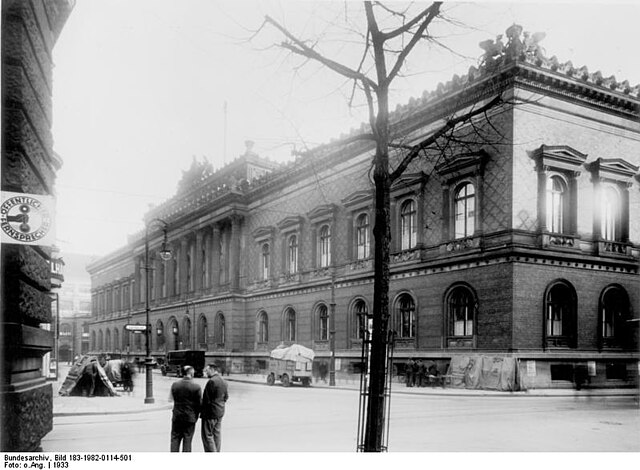The Young Plan was a 1929 attempt to settle issues surrounding the World War I reparations obligations that Germany owed under the terms of Treaty of Versailles. Developed to replace the 1924 Dawes Plan, the Young Plan was negotiated in Paris from February to June 1929 by a committee of international financial experts under the leadership of American businessman and economist Owen D. Young. Representatives of the affected governments then finalised and approved the plan at The Hague conference of 1929/30. Reparations were set at 36 billion Reichsmarks payable through 1988. Including interest, the total came to 112 billion Reichsmarks. The average annual payment was approximately two billion Reichsmarks. The plan came into effect on 17 May 1930, retroactive to 1 September 1929.
Charles Dawes, who led the committee that developed the Dawes Plan
The Reichsbank building in Berlin. The Young Plan brought the bank back fully under German control.
Prime Minister Raymond Poincaré. He was unable to convince the French parliament to accept the Young Plan.
Edited photograph of Alfred Hugenberg (left) with Adolf Hitler in 1931. Both were involved in the attempt to block the Young Plan by referendum.
Following their defeat in World War I, the Central Powers agreed to pay war reparations to the Allied Powers. Each defeated power was required to make payments in either cash or kind. Because of the financial situation in Austria, Hungary, and Turkey after the war, few to no reparations were paid and the requirements for reparations were cancelled. Bulgaria, having paid only a fraction of what was required, saw its reparation figure reduced and then cancelled. Historians have recognized the German requirement to pay reparations as the "chief battleground of the post-war era" and "the focus of the power struggle between France and Germany over whether the Versailles Treaty was to be enforced or revised."
Avocourt, 1918, one of the many destroyed French villages where reconstruction would be funded by reparations
Demonstration against the Treaty of Versailles, in front of the Reichstag.
Trains loaded with machinery deliver their cargo in 1920 as reparation payment in kind.
Protests by gymnasts from the Ruhr at the 1923 Munich Gymnastics Festival. The sign on the left reads "The Ruhr remains German". The right placard reads "We never want to be vassals".








